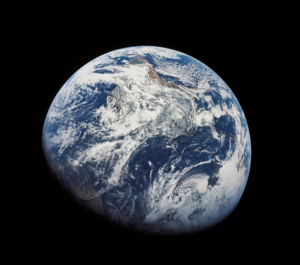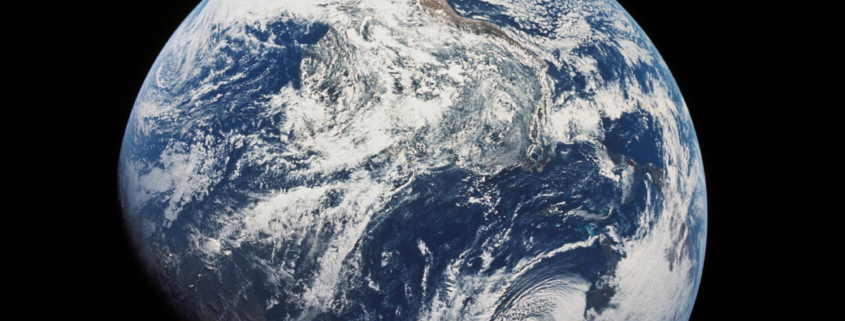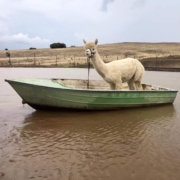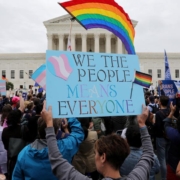Ki Teitzei: On the Health of Our Planet (Deuteronomy 21:10-25:19)
Part of an ongoing series that explores Torah through an ethic of social justice and building a world worthy of the Divine.

Source: NASA (December 1968). One of the first images taken by humans of the whole Earth. Photographed by the crew of Apollo 8 (probably by Bill Anders) the photo shows the Earth at a distance of about 30,000 km.
If you own an ox, this is the Torah portion for you.
Ki Teitzei is not really a story but a list of laws (and laws and laws and more laws). It touches on many diverse subjects – war, marriage and divorce, sexuality, building regulations, clothing requirements, and more – and so it’s hard to say what it’s “about.” But one of the things we find here are various kinds of animal laws. If your neighbour’s ox or sheep runs away, you are required to take it back. If it falls down under its burden, you’re supposed to help it up. If you’re using an ox to thresh your field, you have to let it eat while it’s working.
On the surface, these are about treatment of animals – specifically about preventing cruelty and encouraging humane treatment. And that certainly is part of it. But I think there’s more here than meets the eye. I think the Torah is not just talking about how we treat individual beings; it’s talking about the kind of world we wish to build.
Let me show you what I mean, with a passage that’s not about oxen but about birds:
Deuteronomy 22:6-7
כִּ֣י יִקָּרֵ֣א קַן־צִפּ֣וֹר ׀ לְפָנֶ֡יךָ בַּדֶּ֜רֶךְ בְּכׇל־עֵ֣ץ ׀ א֣וֹ עַל־הָאָ֗רֶץ אֶפְרֹחִים֙ א֣וֹ בֵיצִ֔ים וְהָאֵ֤ם רֹבֶ֙צֶת֙ עַל־הָֽאֶפְרֹחִ֔ים א֖וֹ עַל־הַבֵּיצִ֑ים לֹא־תִקַּ֥ח הָאֵ֖ם עַל־הַבָּנִֽים׃ שַׁלֵּ֤חַ תְּשַׁלַּח֙ אֶת־הָאֵ֔ם וְאֶת־הַבָּנִ֖ים תִּֽקַּֽח־לָ֑ךְ לְמַ֙עַן֙ יִ֣יטַב לָ֔ךְ וְהַאֲרַכְתָּ֖ יָמִֽים׃ {ס}
If, along the road, you chance upon a bird’s nest, in any tree or on the ground, with fledglings or eggs and the mother sitting over the fledglings or on the eggs, do not take the mother together with her young. Let the mother go, and take only the young, in order that you may fare well and have a long life.
So, there you are, walking down the street, and you see a bird’s nest. Since you’re hungry, you decide to trap the bird for lunch, and then have the eggs for dinner. But wait! The Torah says NO. You can take the eggs/young to eat – but you can’t also take the mother bird on the same day. You must shoo her away, THEN gather the eggs. If you do so, the Torah says, you will “fare well and have a long life.”
What’s going on here? Why would the Torah require this relatively challenging action? And what does shooing away a mother bird have to do with living a long and healthy life?
There are a few possibilities. As above, it might be about humane treatment. That’s what Maimonides, the 12th century legalist and philosopher, thinks. He writes that “this is a precaution, to avoid killing the young in the sight of the mother. For animals feel great pain in such circumstances – just like the pain of human beings!” (Guide of the Perplexed 3:48). In other words, animals are people too; they have feelings. And even though Judaism lets us eat animals, it’s cruel to take the young away in the sight of the mother. So don’t do that.
But like I said, I think there’s more here. The explanation I really like comes from the Ramban (Rabbi Moshe ben Nachman, a 13th century mystical commentator from Spain), who gives a very different reason for the prohibition. He says:
[The Torah] does not permit us to destroy the species, even though it allows slaughter within that species. And one who kills the mother and the young on one day…is as if they have cut off that species.
Now we’re getting deeper. According to the Ramban, this isn’t just about the individual animal – though that matters. It’s about the entire species. Human beings might be allowed to eat meat, to use animals for our purposes, but we are not entitled to do things that will endanger a species; that will diminish the biodiversity of the world. We have a responsibility to the earth and its overall health.
The most fundamental thing that the Torah teaches about the earth is that the world is an expression of God’s wisdom. We’re told that after creating everything, “God looked over everything that had been made, and it was tov me’od – very good” (Genesis 1:31). For the Rabbis, tov me’od means not only that this world is beautiful, but that it is orderly; that God created it with wisdom and that its many working parts are an expression of something divine.
And there’s truth to that. Think about food chains and ecosystems. Think about the way that various species live together in delicate balance – both with one another and with the weather patterns and changing seasons. Think about the way this world functions almost as a living organism. And think about how the loss of even one species – or a slight change in temperature – can throw all of that off. Can be a detriment to everyone and everything living here.
I am writing this in a week in which California is experiencing its first tropical storm in almost a century, being inundated with torrential rain, flooding, and mudslides that have broken all of the records. I am writing this in a year that has seen the worst wildfire season on record, in which cities all across the world are suffering from air quality warnings, droughts, and famine. Before our very eyes, our world is being thrown off kilter – the climate is being irreparably damaged, the delicate balance of species is being ransacked. We have forgotten the Torah’s message – that this world is a gift from God, and that we are responsible to safeguard it. We have forgotten that it is only by acting as responsible stewards that can we can “fare well and have a long life.”
So yes, I think there’s more here than birds and oxen. The Torah has an urgent message for us that we need to clean up our act. That building a better world is about recognizing who shares this world with us – both fellow humans and many non-human species – and that we are responsible for one another’s wellbeing.
There is still much that we can do – as Jews and as citizens of the world – to promote the health of his planet we all share. Organizations such as Dayenu: A Jewish Call to Climate Action and JewishVeg can be starting points for advocacy and for rethinking our own lifestyle. I also recommend a new book, The Sacred Earth, which offers a number of important Jewish perspectives on our planet.
We have much work to do. But through advocacy, and by shifting our own actions, we can begin to bring healing to the planet and remind others of our responsibility to do so. Ultimately, Judaism teaches that we are God’s partners in repairing and maintaining this world, and caring for everything in it.

Rabbi Micah Streiffer is a rabbi, teacher, writer, and lifelong student who is known for his engaging style in the classroom and his ability to make Jewish texts and ideas come to life. Micah is the Founder of LAASOK, a virtual Beit Midrash (“House of Study”) where liberal Jewish learners can deepen their connection with Judaism through meaningful study of sacred texts over a virtual platform. He also hosts the popular Seven Minute Torah podcast, a weekly exploration of the Torah portion through liberal Jewish eyes.









